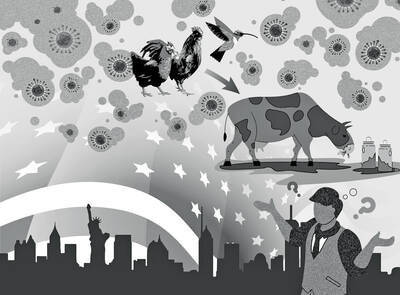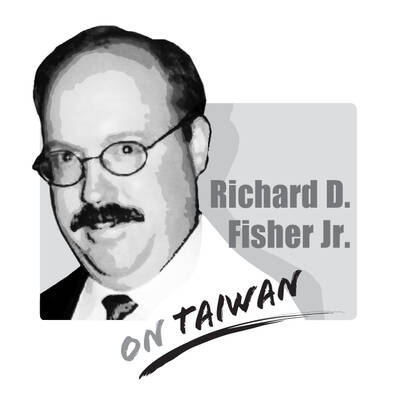The long-simmering controversy over Taiwan's national title and national dignity was brought into the open at the Athens Olympics. At the historic moment when two Taiwanese taekwondo athletes stepped onto the podium to receive their gold medals, our country suddenly became "Chinese Taipei" -- the music that was played was not our national anthem and the flag that was raised was not our national flag. Yet the athletes saluted. With this absurd situation happening twice in the space of minutes, how could a reasonable person not feel consternation at the absurdity of it all?
To avoid confusing its American audience, NBC television clarified each time the name was used that "Chinese Taipei" referred to Taiwan. Japanese and South Korean television were more impatient and simply dropped "Chinese Taipei" altogether in its reports, using "Taiwan" instead.
It is therefore pleasing to note that apart from China, media outlets from almost every other country are willing to refer to the nation as Taiwan. But it is galling that media outlets back home and Taiwan's officials insist on using "Chinese Taipei." The flag with the Olympic rings, the plum blossom and the symbol of the Chinese Nationalist Party (KMT) is not our national flag, nor is the National Flag Song our national anthem -- yet there is an intriguing and disquieting willingness to accommodate them beyond the practicality of athletes being accepted by the International Olympic Committee (IOC).
There will be greater complications in 2008, when the Olympics are held in Beijing. Taiwan's national title and its dignity will be compromised. In Athens, Taiwan placed advertising in the airport and on city buses using both "Chinese Taipei" and Taiwan to increase international recognition, but pressure on the Greek government from China forced the withdrawal of the advertisements, despite the fact that their presence was the result of a perfectly legal financial transaction.
It is evident from all this that four years from now China will be most unwilling for us to use either "Chinese Taipei" or "Taiwan," and will accept only "Taipei, China" -- a name that puts us in the same category as "Hong Kong, China" and "Macao, China," which are in fact Chinese administrative districts.
China will only be content when Taiwan adopts a title that represents an acceptance of its own obliteration. Its attitude is so obvious that the public here and reasonable people in the international community will begin to wonder whether Beijing can be trusted not to turn the Olympics into a sledgehammer for its ultranationalist agenda.
In the meantime, using the name "Chinese Taipei" is as laughable as referring to the US as "America, Washington." It is meaningless.
It is highly unlikely that the IOC will accept a change of name for Taiwan before the next Games, but why should the IOC be held responsible for this in the first instance?
Any campaign pushing for a name change has to begin with our own media, officials and the people on the street. Only if the nation learns to use "Taiwan" to refer to itself -- and on the international stage in particular -- will China's tremendous opportunity to humiliate us at the next Olympics be hindered.
A series of strong earthquakes in Hualien County not only caused severe damage in Taiwan, but also revealed that China’s power has permeated everywhere. A Taiwanese woman posted on the Internet that she found clips of the earthquake — which were recorded by the security camera in her home — on the Chinese social media platform Xiaohongshu. It is spine-chilling that the problem might be because the security camera was manufactured in China. China has widely collected information, infringed upon public privacy and raised information security threats through various social media platforms, as well as telecommunication and security equipment. Several former TikTok employees revealed

The bird flu outbreak at US dairy farms keeps finding alarming new ways to surprise scientists. Last week, the US Department of Agriculture (USDA) confirmed that H5N1 is spreading not just from birds to herds, but among cows. Meanwhile, media reports say that an unknown number of cows are asymptomatic. Although the risk to humans is still low, it is clear that far more work needs to be done to get a handle on the reach of the virus and how it is being transmitted. That would require the USDA and the Centers for Disease Control and Prevention (CDC) to get

For the incoming Administration of President-elect William Lai (賴清德), successfully deterring a Chinese Communist Party (CCP) attack or invasion of democratic Taiwan over his four-year term would be a clear victory. But it could also be a curse, because during those four years the CCP’s People’s Liberation Army (PLA) will grow far stronger. As such, increased vigilance in Washington and Taipei will be needed to ensure that already multiplying CCP threat trends don’t overwhelm Taiwan, the United States, and their democratic allies. One CCP attempt to overwhelm was announced on April 19, 2024, namely that the PLA had erred in combining major missions
On April 11, Japanese Prime Minister Fumio Kishida delivered a speech at a joint meeting of the US Congress in Washington, in which he said that “China’s current external stance and military actions present an unprecedented and the greatest strategic challenge … to the peace and stability of the international community.” Kishida emphasized Japan’s role as “the US’ closest ally.” “The international order that the US worked for generations to build is facing new challenges,” Kishida said. “I understand it is a heavy burden to carry such hopes on your shoulders,” he said. “Japan is already standing shoulder to shoulder